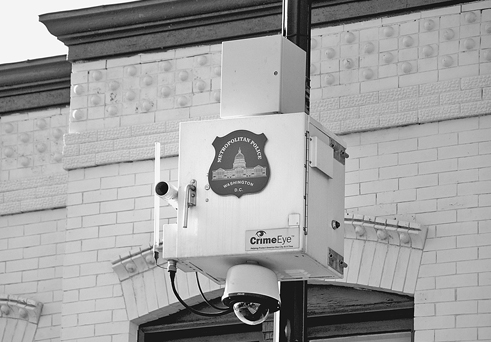Citizens association funds security camera network

By Katie Pearce Current Staff Writer
A suite of security cameras will be installed on residential streets in Georgetown, following success of a pilot program and recent price drops in the technology.
The Citizens Association of Georgetown has raised funds to mount 10 cameras throughout the neighborhood, with three expected to go in place in January, according to group president Jennifer Altemus.
“We hope that it will be a deterrent in the neighborhood and that we’ll catch people,” she said.
The cameras, which can capture details like facial features and car license-tag numbers, stream footage to a password-protected Internet database, Altemus said.
The citizens group is still deciding on locations. So far, one camera has been installed as a test on the 3100 block of N Street — also the area where a pilot security camera program was launched in 2006.
The Georgetown business community is also eyeing the technology, according to Edward Dent, who serves on safety committees for the Georgetown Business Association and the Georgetown Business Improvement District, as well as for the citizens association.
The business groups “wholeheartedly support it; it’s just a matter of the money,” said Dent. He predicted that there could be firm progress on that front next month.
Dent, who lives in the 3100 block of N Street, helped jump-start the pilot program there in 2006.
Following a citywide crime spike that summer, which included a high-profile violent murder on Q Street NW, Georgetowners got together to brainstorm their own solutions. “We had big meetings on the subject … [about] the armed robberies and murders,” Dent said.
Dent, who had experience with digital cameras, orchestrated the installation of three on his block. Most residents on the block chipped in about $400 each to fund the cameras, which cost around $11,500 apiece, he said.
The camera technology was different then — not only was it markedly more expensive than it is today, but it also captured images “passively” for later analysis. Dent said “the command center” for the three cameras is locked in a closet in his home, and the Metropolitan Police Department contacts him when the agency needs information from it.
“As long as they pinpoint close to a time, I can scan and see if I can come up with pictures or videos that would be useful,” he said.
In the first year and a half, according to Dent, the cameras captured evidence related to about eight hit-and-runs, and to six “major crimes” including robberies of nearby commercial stores in which suspects fled on N Street. The technology also helped solve other types of crimes, like vandalism, graffiti, stalking and thefts of postal items, he said.
As the years went on, Dent said, “we’ve had a reduction of the number of incidents on our block.” There’s always a question of whether that’s due to “coincidence or the cameras,” he conceded, but he believes the cameras can be an effective deterrent.
“The whole idea here of the cameras is a) apprehension, b) conviction and c) word getting into the criminal community,” he said.
A widespread collection of cameras, as the citizens association has planned, should help spread the message that “committing crime over here in Georgetown is too dangerous,” Dent said.
President Altemus said the citizens association is looking into locations that are “gateways” into Georgetown, such as parts of P, Q and 34th streets. The cameras will be mounted on private property, requiring permission from owners, but will record public space, she said. Signs will announce their presence.
Right now the goal is for 10 cameras, but “we’re going to have to feel it out” to see if more should be installed, Altemus said.
The city also manages its own system of security cameras, around 85 total according to the police department’s website. In Georgetown, a camera was installed at Wisconsin Avenue and P Street in 2006.
Dent said he believes there will be more private funding of security cameras throughout residential areas of D.C., since the cost of technology has come down so much recently. The cameras planned for Georgetown range between $1,700 and $2,500 including installation, he said.
“I’m sure you’re going to see this in a much bigger way,” Dent predicted.
This article appears in the Dec. 21 issue of The Georgetown Current newspaper.
